NSG2204, Semester 2: Critical Appraisal of a Healthcare Research Paper
VerifiedAdded on 2022/10/19
|9
|2079
|124
Report
AI Summary
This report presents a critical appraisal of a research paper titled "Preoperative physiotherapy for the prevention of respiratory complications after upper abdominal surgery: pragmatic, double blinded, multicentre randomized controlled trial" by Boden et al. (2018). The student evaluates the study's introduction, literature review, methodology, ethical considerations, results, and recommendations. The paper examines the effectiveness of preoperative physiotherapy sessions in reducing postoperative respiratory complications. The student analyzes the study's randomized controlled trial design, inclusion criteria, statistical analysis, and ethical approvals. The appraisal highlights the study's strengths, such as the multicentre design and high follow-up rate, and limitations, including the recruitment from a single hospital and potential for bias. The report emphasizes the significant results, where the intervention group showed halved symptoms of complications, and recommends the integration of physiotherapy interventions in routine clinical care. The student concludes by discussing the study's implications for evidence-based practice and the need for multidisciplinary team training.
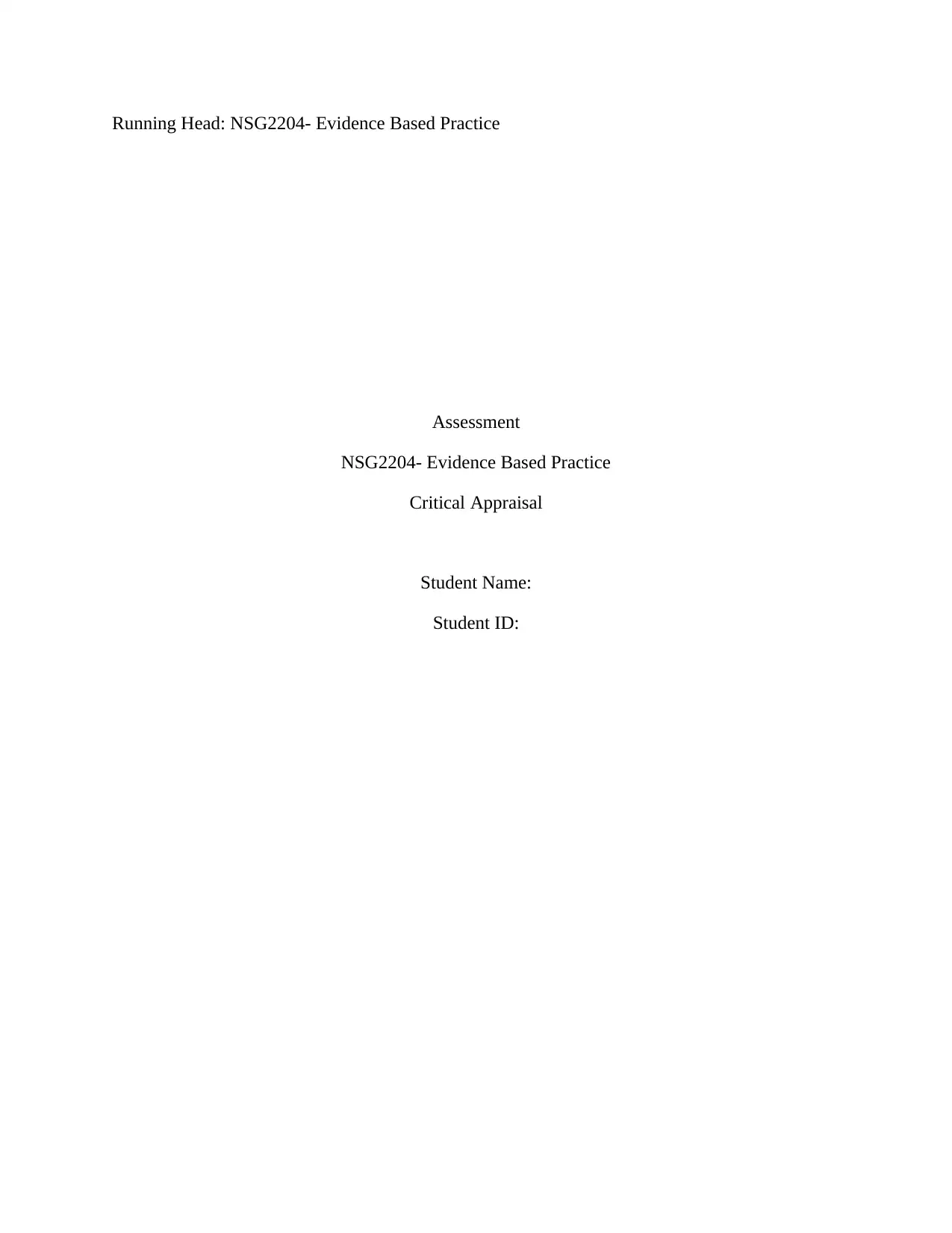
Running Head: NSG2204- Evidence Based Practice
Assessment
NSG2204- Evidence Based Practice
Critical Appraisal
Student Name:
Student ID:
Assessment
NSG2204- Evidence Based Practice
Critical Appraisal
Student Name:
Student ID:
Paraphrase This Document
Need a fresh take? Get an instant paraphrase of this document with our AI Paraphraser
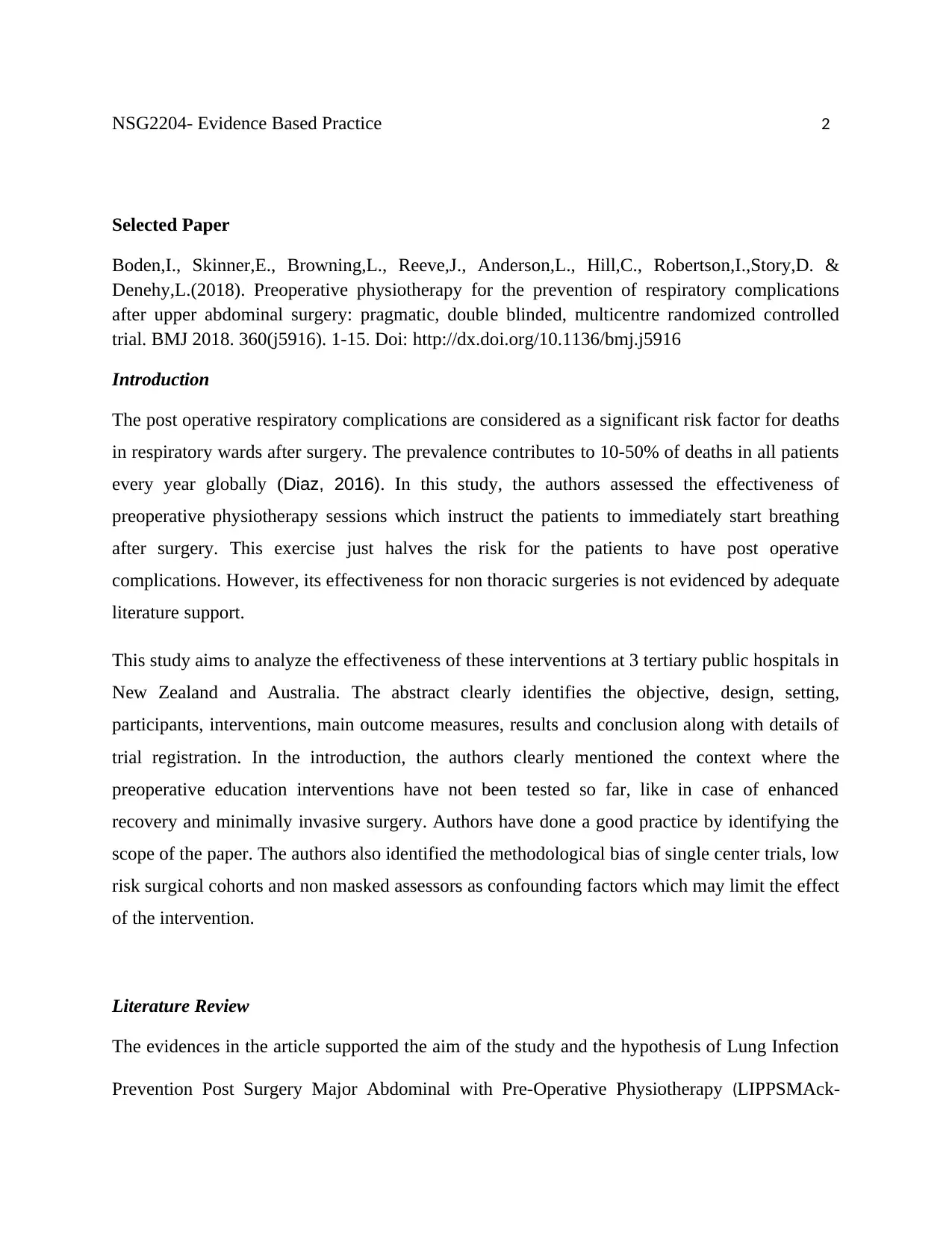
NSG2204- Evidence Based Practice 2
Selected Paper
Boden,I., Skinner,E., Browning,L., Reeve,J., Anderson,L., Hill,C., Robertson,I.,Story,D. &
Denehy,L.(2018). Preoperative physiotherapy for the prevention of respiratory complications
after upper abdominal surgery: pragmatic, double blinded, multicentre randomized controlled
trial. BMJ 2018. 360(j5916). 1-15. Doi: http://dx.doi.org/10.1136/bmj.j5916
Introduction
The post operative respiratory complications are considered as a significant risk factor for deaths
in respiratory wards after surgery. The prevalence contributes to 10-50% of deaths in all patients
every year globally (Diaz, 2016). In this study, the authors assessed the effectiveness of
preoperative physiotherapy sessions which instruct the patients to immediately start breathing
after surgery. This exercise just halves the risk for the patients to have post operative
complications. However, its effectiveness for non thoracic surgeries is not evidenced by adequate
literature support.
This study aims to analyze the effectiveness of these interventions at 3 tertiary public hospitals in
New Zealand and Australia. The abstract clearly identifies the objective, design, setting,
participants, interventions, main outcome measures, results and conclusion along with details of
trial registration. In the introduction, the authors clearly mentioned the context where the
preoperative education interventions have not been tested so far, like in case of enhanced
recovery and minimally invasive surgery. Authors have done a good practice by identifying the
scope of the paper. The authors also identified the methodological bias of single center trials, low
risk surgical cohorts and non masked assessors as confounding factors which may limit the effect
of the intervention.
Literature Review
The evidences in the article supported the aim of the study and the hypothesis of Lung Infection
Prevention Post Surgery Major Abdominal with Pre-Operative Physiotherapy (LIPPSMAck-
Selected Paper
Boden,I., Skinner,E., Browning,L., Reeve,J., Anderson,L., Hill,C., Robertson,I.,Story,D. &
Denehy,L.(2018). Preoperative physiotherapy for the prevention of respiratory complications
after upper abdominal surgery: pragmatic, double blinded, multicentre randomized controlled
trial. BMJ 2018. 360(j5916). 1-15. Doi: http://dx.doi.org/10.1136/bmj.j5916
Introduction
The post operative respiratory complications are considered as a significant risk factor for deaths
in respiratory wards after surgery. The prevalence contributes to 10-50% of deaths in all patients
every year globally (Diaz, 2016). In this study, the authors assessed the effectiveness of
preoperative physiotherapy sessions which instruct the patients to immediately start breathing
after surgery. This exercise just halves the risk for the patients to have post operative
complications. However, its effectiveness for non thoracic surgeries is not evidenced by adequate
literature support.
This study aims to analyze the effectiveness of these interventions at 3 tertiary public hospitals in
New Zealand and Australia. The abstract clearly identifies the objective, design, setting,
participants, interventions, main outcome measures, results and conclusion along with details of
trial registration. In the introduction, the authors clearly mentioned the context where the
preoperative education interventions have not been tested so far, like in case of enhanced
recovery and minimally invasive surgery. Authors have done a good practice by identifying the
scope of the paper. The authors also identified the methodological bias of single center trials, low
risk surgical cohorts and non masked assessors as confounding factors which may limit the effect
of the intervention.
Literature Review
The evidences in the article supported the aim of the study and the hypothesis of Lung Infection
Prevention Post Surgery Major Abdominal with Pre-Operative Physiotherapy (LIPPSMAck-
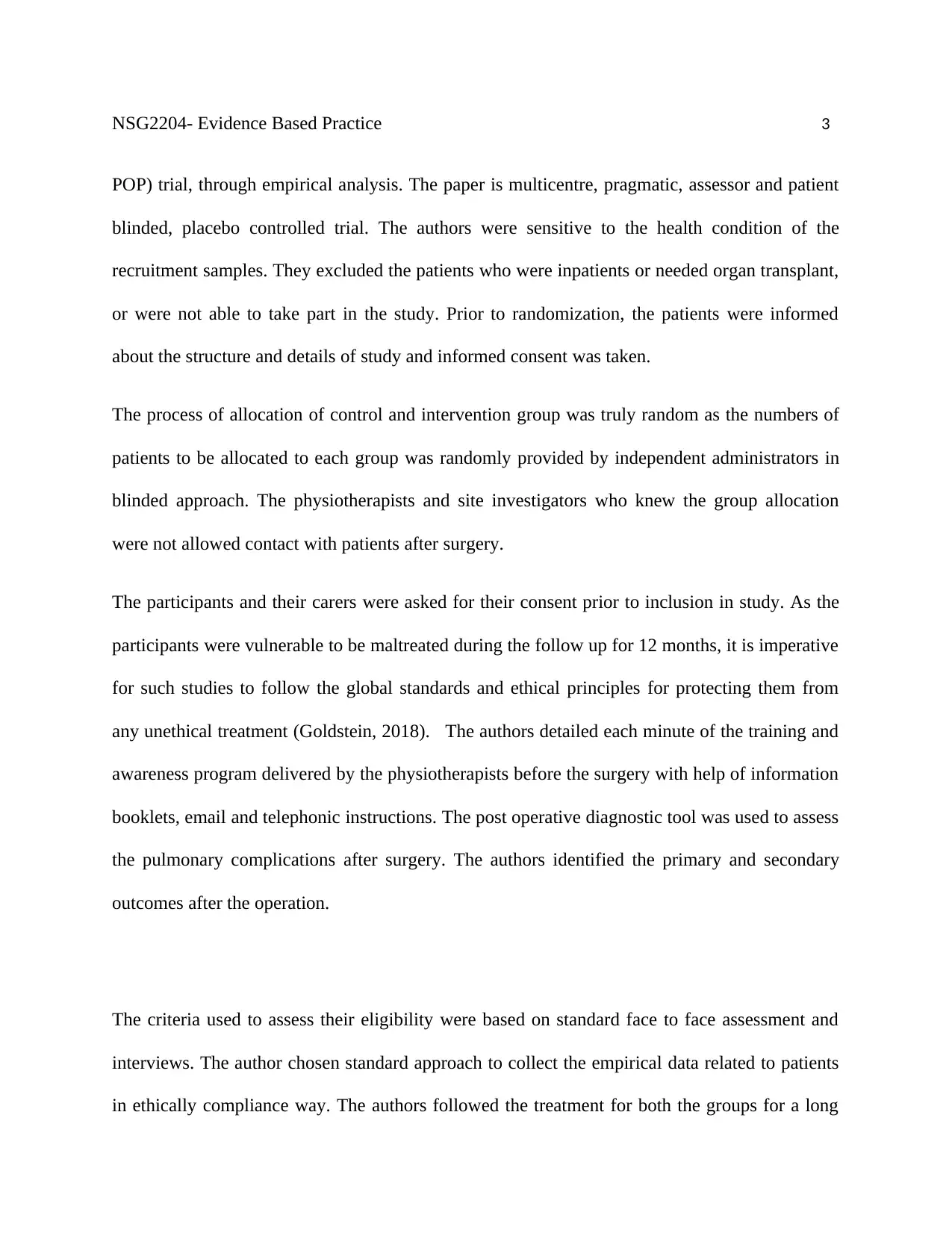
NSG2204- Evidence Based Practice 3
POP) trial, through empirical analysis. The paper is multicentre, pragmatic, assessor and patient
blinded, placebo controlled trial. The authors were sensitive to the health condition of the
recruitment samples. They excluded the patients who were inpatients or needed organ transplant,
or were not able to take part in the study. Prior to randomization, the patients were informed
about the structure and details of study and informed consent was taken.
The process of allocation of control and intervention group was truly random as the numbers of
patients to be allocated to each group was randomly provided by independent administrators in
blinded approach. The physiotherapists and site investigators who knew the group allocation
were not allowed contact with patients after surgery.
The participants and their carers were asked for their consent prior to inclusion in study. As the
participants were vulnerable to be maltreated during the follow up for 12 months, it is imperative
for such studies to follow the global standards and ethical principles for protecting them from
any unethical treatment (Goldstein, 2018). The authors detailed each minute of the training and
awareness program delivered by the physiotherapists before the surgery with help of information
booklets, email and telephonic instructions. The post operative diagnostic tool was used to assess
the pulmonary complications after surgery. The authors identified the primary and secondary
outcomes after the operation.
The criteria used to assess their eligibility were based on standard face to face assessment and
interviews. The author chosen standard approach to collect the empirical data related to patients
in ethically compliance way. The authors followed the treatment for both the groups for a long
POP) trial, through empirical analysis. The paper is multicentre, pragmatic, assessor and patient
blinded, placebo controlled trial. The authors were sensitive to the health condition of the
recruitment samples. They excluded the patients who were inpatients or needed organ transplant,
or were not able to take part in the study. Prior to randomization, the patients were informed
about the structure and details of study and informed consent was taken.
The process of allocation of control and intervention group was truly random as the numbers of
patients to be allocated to each group was randomly provided by independent administrators in
blinded approach. The physiotherapists and site investigators who knew the group allocation
were not allowed contact with patients after surgery.
The participants and their carers were asked for their consent prior to inclusion in study. As the
participants were vulnerable to be maltreated during the follow up for 12 months, it is imperative
for such studies to follow the global standards and ethical principles for protecting them from
any unethical treatment (Goldstein, 2018). The authors detailed each minute of the training and
awareness program delivered by the physiotherapists before the surgery with help of information
booklets, email and telephonic instructions. The post operative diagnostic tool was used to assess
the pulmonary complications after surgery. The authors identified the primary and secondary
outcomes after the operation.
The criteria used to assess their eligibility were based on standard face to face assessment and
interviews. The author chosen standard approach to collect the empirical data related to patients
in ethically compliance way. The authors followed the treatment for both the groups for a long
⊘ This is a preview!⊘
Do you want full access?
Subscribe today to unlock all pages.

Trusted by 1+ million students worldwide
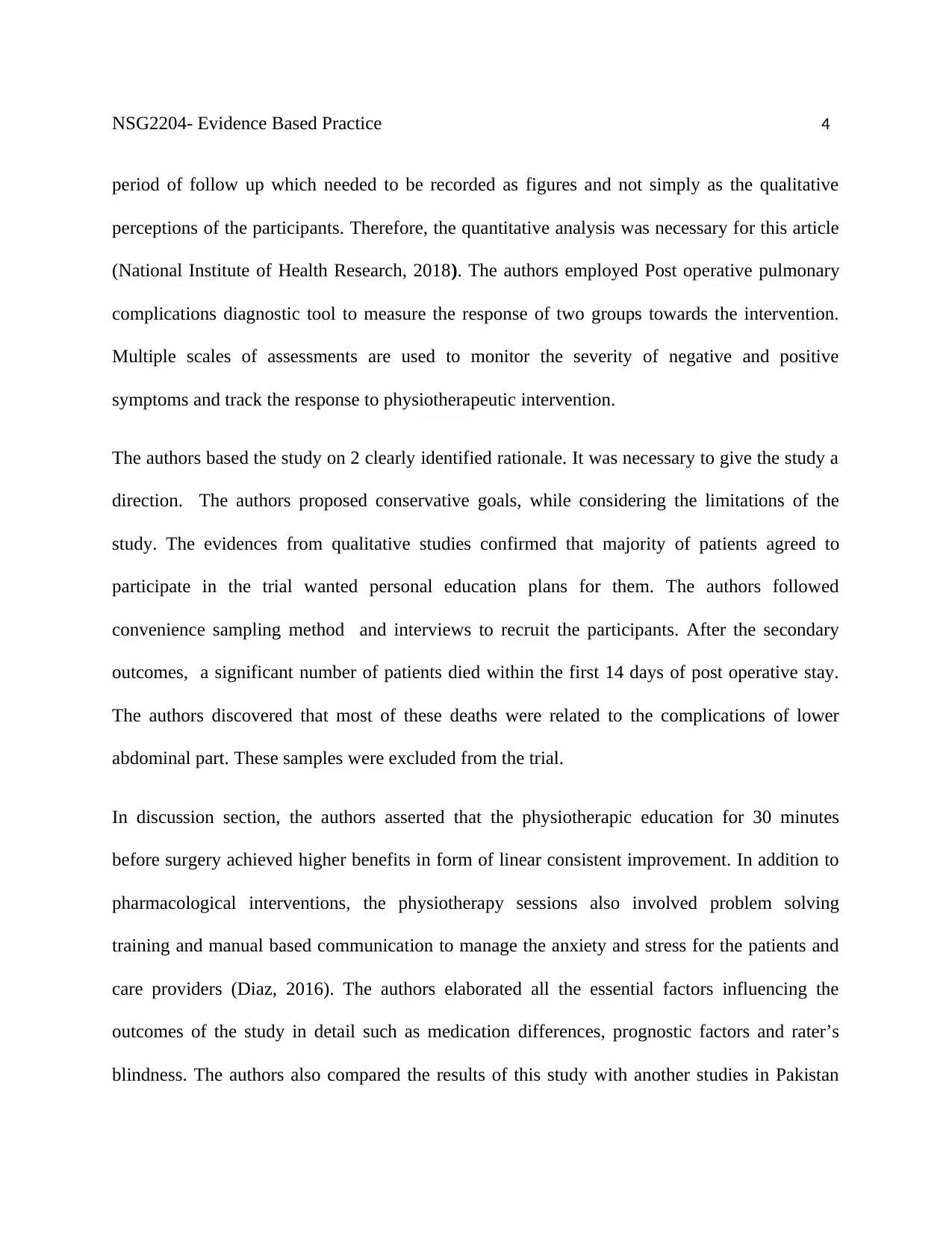
NSG2204- Evidence Based Practice 4
period of follow up which needed to be recorded as figures and not simply as the qualitative
perceptions of the participants. Therefore, the quantitative analysis was necessary for this article
(National Institute of Health Research, 2018). The authors employed Post operative pulmonary
complications diagnostic tool to measure the response of two groups towards the intervention.
Multiple scales of assessments are used to monitor the severity of negative and positive
symptoms and track the response to physiotherapeutic intervention.
The authors based the study on 2 clearly identified rationale. It was necessary to give the study a
direction. The authors proposed conservative goals, while considering the limitations of the
study. The evidences from qualitative studies confirmed that majority of patients agreed to
participate in the trial wanted personal education plans for them. The authors followed
convenience sampling method and interviews to recruit the participants. After the secondary
outcomes, a significant number of patients died within the first 14 days of post operative stay.
The authors discovered that most of these deaths were related to the complications of lower
abdominal part. These samples were excluded from the trial.
In discussion section, the authors asserted that the physiotherapic education for 30 minutes
before surgery achieved higher benefits in form of linear consistent improvement. In addition to
pharmacological interventions, the physiotherapy sessions also involved problem solving
training and manual based communication to manage the anxiety and stress for the patients and
care providers (Diaz, 2016). The authors elaborated all the essential factors influencing the
outcomes of the study in detail such as medication differences, prognostic factors and rater’s
blindness. The authors also compared the results of this study with another studies in Pakistan
period of follow up which needed to be recorded as figures and not simply as the qualitative
perceptions of the participants. Therefore, the quantitative analysis was necessary for this article
(National Institute of Health Research, 2018). The authors employed Post operative pulmonary
complications diagnostic tool to measure the response of two groups towards the intervention.
Multiple scales of assessments are used to monitor the severity of negative and positive
symptoms and track the response to physiotherapeutic intervention.
The authors based the study on 2 clearly identified rationale. It was necessary to give the study a
direction. The authors proposed conservative goals, while considering the limitations of the
study. The evidences from qualitative studies confirmed that majority of patients agreed to
participate in the trial wanted personal education plans for them. The authors followed
convenience sampling method and interviews to recruit the participants. After the secondary
outcomes, a significant number of patients died within the first 14 days of post operative stay.
The authors discovered that most of these deaths were related to the complications of lower
abdominal part. These samples were excluded from the trial.
In discussion section, the authors asserted that the physiotherapic education for 30 minutes
before surgery achieved higher benefits in form of linear consistent improvement. In addition to
pharmacological interventions, the physiotherapy sessions also involved problem solving
training and manual based communication to manage the anxiety and stress for the patients and
care providers (Diaz, 2016). The authors elaborated all the essential factors influencing the
outcomes of the study in detail such as medication differences, prognostic factors and rater’s
blindness. The authors also compared the results of this study with another studies in Pakistan
Paraphrase This Document
Need a fresh take? Get an instant paraphrase of this document with our AI Paraphraser
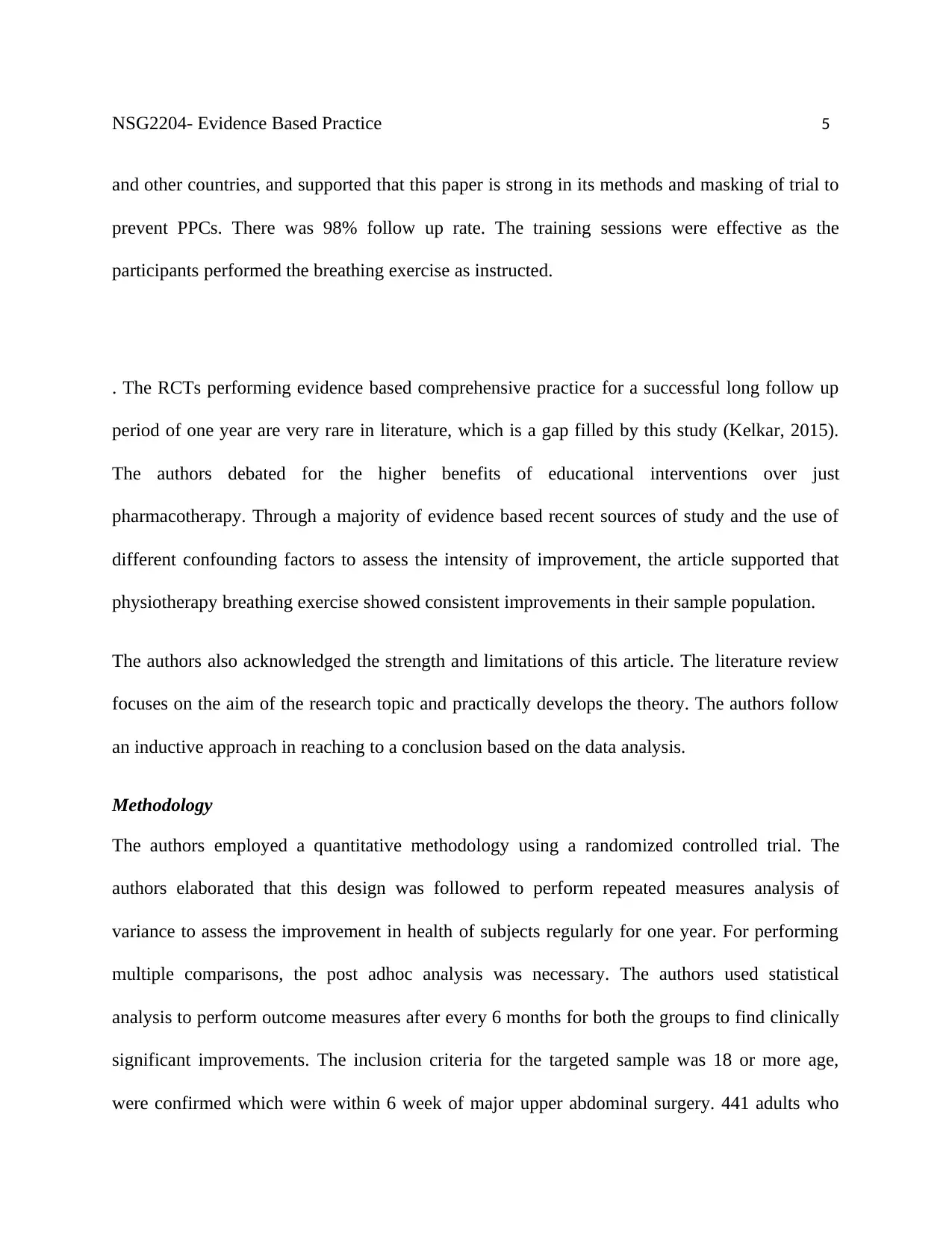
NSG2204- Evidence Based Practice 5
and other countries, and supported that this paper is strong in its methods and masking of trial to
prevent PPCs. There was 98% follow up rate. The training sessions were effective as the
participants performed the breathing exercise as instructed.
. The RCTs performing evidence based comprehensive practice for a successful long follow up
period of one year are very rare in literature, which is a gap filled by this study (Kelkar, 2015).
The authors debated for the higher benefits of educational interventions over just
pharmacotherapy. Through a majority of evidence based recent sources of study and the use of
different confounding factors to assess the intensity of improvement, the article supported that
physiotherapy breathing exercise showed consistent improvements in their sample population.
The authors also acknowledged the strength and limitations of this article. The literature review
focuses on the aim of the research topic and practically develops the theory. The authors follow
an inductive approach in reaching to a conclusion based on the data analysis.
Methodology
The authors employed a quantitative methodology using a randomized controlled trial. The
authors elaborated that this design was followed to perform repeated measures analysis of
variance to assess the improvement in health of subjects regularly for one year. For performing
multiple comparisons, the post adhoc analysis was necessary. The authors used statistical
analysis to perform outcome measures after every 6 months for both the groups to find clinically
significant improvements. The inclusion criteria for the targeted sample was 18 or more age,
were confirmed which were within 6 week of major upper abdominal surgery. 441 adults who
and other countries, and supported that this paper is strong in its methods and masking of trial to
prevent PPCs. There was 98% follow up rate. The training sessions were effective as the
participants performed the breathing exercise as instructed.
. The RCTs performing evidence based comprehensive practice for a successful long follow up
period of one year are very rare in literature, which is a gap filled by this study (Kelkar, 2015).
The authors debated for the higher benefits of educational interventions over just
pharmacotherapy. Through a majority of evidence based recent sources of study and the use of
different confounding factors to assess the intensity of improvement, the article supported that
physiotherapy breathing exercise showed consistent improvements in their sample population.
The authors also acknowledged the strength and limitations of this article. The literature review
focuses on the aim of the research topic and practically develops the theory. The authors follow
an inductive approach in reaching to a conclusion based on the data analysis.
Methodology
The authors employed a quantitative methodology using a randomized controlled trial. The
authors elaborated that this design was followed to perform repeated measures analysis of
variance to assess the improvement in health of subjects regularly for one year. For performing
multiple comparisons, the post adhoc analysis was necessary. The authors used statistical
analysis to perform outcome measures after every 6 months for both the groups to find clinically
significant improvements. The inclusion criteria for the targeted sample was 18 or more age,
were confirmed which were within 6 week of major upper abdominal surgery. 441 adults who
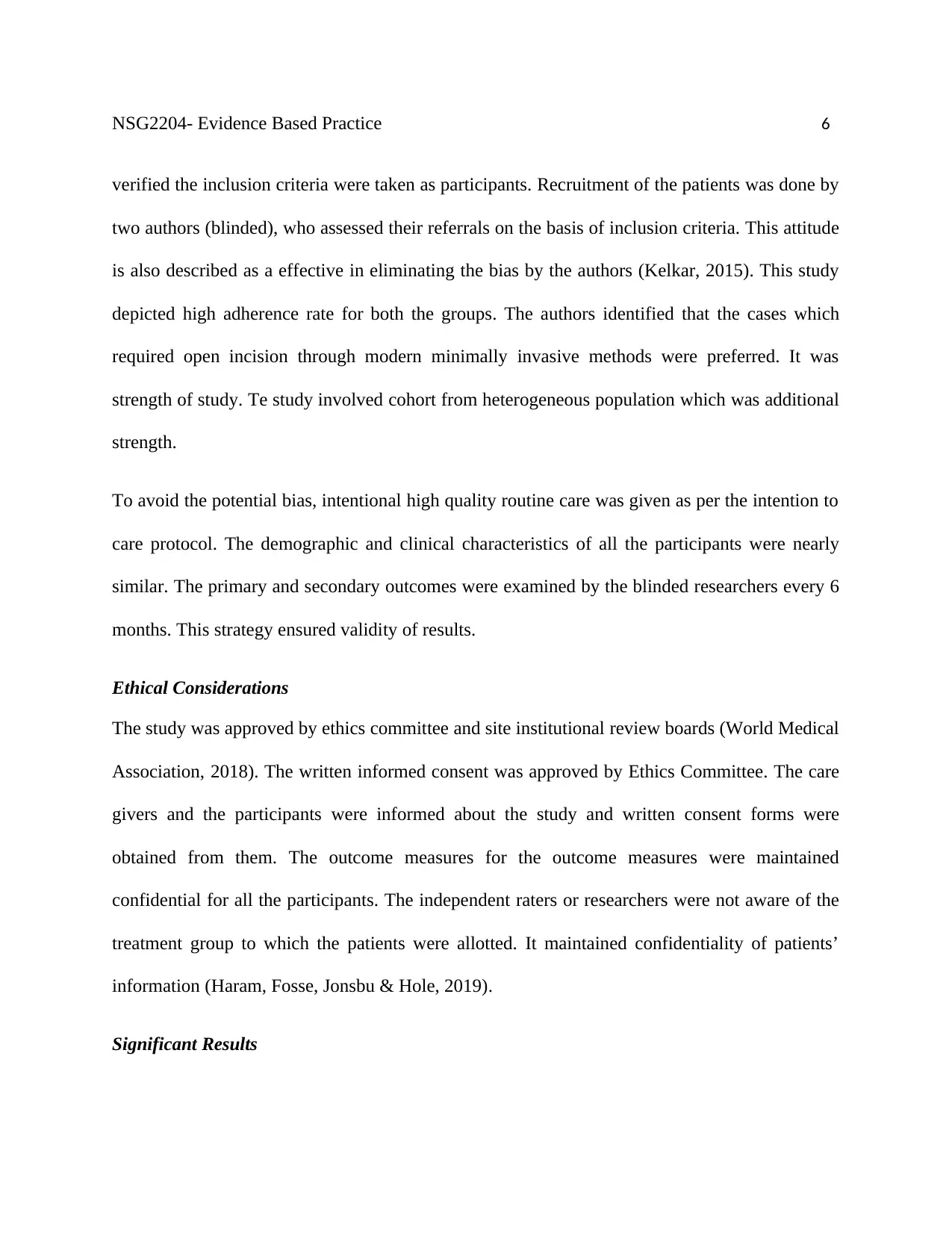
NSG2204- Evidence Based Practice 6
verified the inclusion criteria were taken as participants. Recruitment of the patients was done by
two authors (blinded), who assessed their referrals on the basis of inclusion criteria. This attitude
is also described as a effective in eliminating the bias by the authors (Kelkar, 2015). This study
depicted high adherence rate for both the groups. The authors identified that the cases which
required open incision through modern minimally invasive methods were preferred. It was
strength of study. Te study involved cohort from heterogeneous population which was additional
strength.
To avoid the potential bias, intentional high quality routine care was given as per the intention to
care protocol. The demographic and clinical characteristics of all the participants were nearly
similar. The primary and secondary outcomes were examined by the blinded researchers every 6
months. This strategy ensured validity of results.
Ethical Considerations
The study was approved by ethics committee and site institutional review boards (World Medical
Association, 2018). The written informed consent was approved by Ethics Committee. The care
givers and the participants were informed about the study and written consent forms were
obtained from them. The outcome measures for the outcome measures were maintained
confidential for all the participants. The independent raters or researchers were not aware of the
treatment group to which the patients were allotted. It maintained confidentiality of patients’
information (Haram, Fosse, Jonsbu & Hole, 2019).
Significant Results
verified the inclusion criteria were taken as participants. Recruitment of the patients was done by
two authors (blinded), who assessed their referrals on the basis of inclusion criteria. This attitude
is also described as a effective in eliminating the bias by the authors (Kelkar, 2015). This study
depicted high adherence rate for both the groups. The authors identified that the cases which
required open incision through modern minimally invasive methods were preferred. It was
strength of study. Te study involved cohort from heterogeneous population which was additional
strength.
To avoid the potential bias, intentional high quality routine care was given as per the intention to
care protocol. The demographic and clinical characteristics of all the participants were nearly
similar. The primary and secondary outcomes were examined by the blinded researchers every 6
months. This strategy ensured validity of results.
Ethical Considerations
The study was approved by ethics committee and site institutional review boards (World Medical
Association, 2018). The written informed consent was approved by Ethics Committee. The care
givers and the participants were informed about the study and written consent forms were
obtained from them. The outcome measures for the outcome measures were maintained
confidential for all the participants. The independent raters or researchers were not aware of the
treatment group to which the patients were allotted. It maintained confidentiality of patients’
information (Haram, Fosse, Jonsbu & Hole, 2019).
Significant Results
⊘ This is a preview!⊘
Do you want full access?
Subscribe today to unlock all pages.

Trusted by 1+ million students worldwide
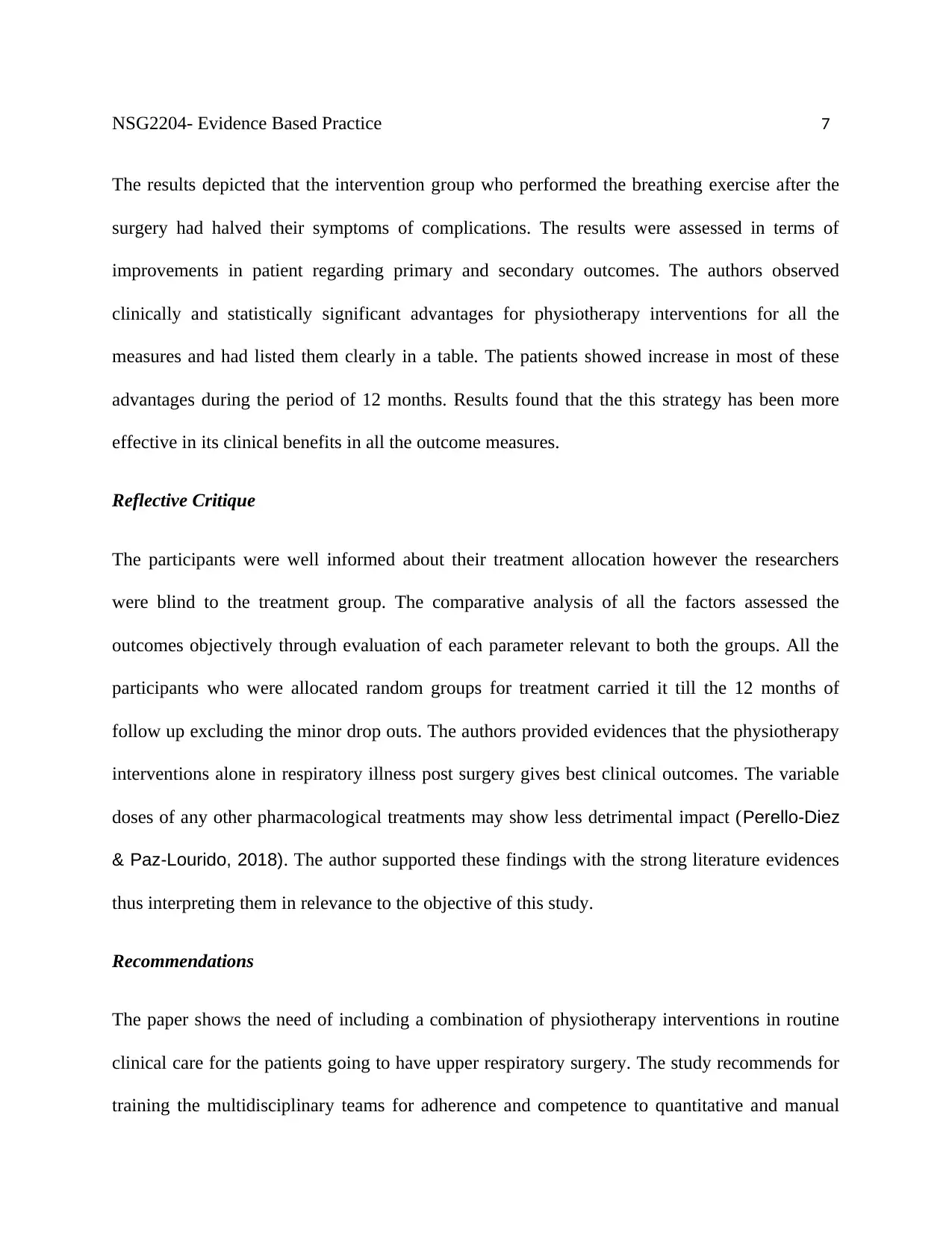
NSG2204- Evidence Based Practice 7
The results depicted that the intervention group who performed the breathing exercise after the
surgery had halved their symptoms of complications. The results were assessed in terms of
improvements in patient regarding primary and secondary outcomes. The authors observed
clinically and statistically significant advantages for physiotherapy interventions for all the
measures and had listed them clearly in a table. The patients showed increase in most of these
advantages during the period of 12 months. Results found that the this strategy has been more
effective in its clinical benefits in all the outcome measures.
Reflective Critique
The participants were well informed about their treatment allocation however the researchers
were blind to the treatment group. The comparative analysis of all the factors assessed the
outcomes objectively through evaluation of each parameter relevant to both the groups. All the
participants who were allocated random groups for treatment carried it till the 12 months of
follow up excluding the minor drop outs. The authors provided evidences that the physiotherapy
interventions alone in respiratory illness post surgery gives best clinical outcomes. The variable
doses of any other pharmacological treatments may show less detrimental impact (Perello-Diez
& Paz-Lourido, 2018). The author supported these findings with the strong literature evidences
thus interpreting them in relevance to the objective of this study.
Recommendations
The paper shows the need of including a combination of physiotherapy interventions in routine
clinical care for the patients going to have upper respiratory surgery. The study recommends for
training the multidisciplinary teams for adherence and competence to quantitative and manual
The results depicted that the intervention group who performed the breathing exercise after the
surgery had halved their symptoms of complications. The results were assessed in terms of
improvements in patient regarding primary and secondary outcomes. The authors observed
clinically and statistically significant advantages for physiotherapy interventions for all the
measures and had listed them clearly in a table. The patients showed increase in most of these
advantages during the period of 12 months. Results found that the this strategy has been more
effective in its clinical benefits in all the outcome measures.
Reflective Critique
The participants were well informed about their treatment allocation however the researchers
were blind to the treatment group. The comparative analysis of all the factors assessed the
outcomes objectively through evaluation of each parameter relevant to both the groups. All the
participants who were allocated random groups for treatment carried it till the 12 months of
follow up excluding the minor drop outs. The authors provided evidences that the physiotherapy
interventions alone in respiratory illness post surgery gives best clinical outcomes. The variable
doses of any other pharmacological treatments may show less detrimental impact (Perello-Diez
& Paz-Lourido, 2018). The author supported these findings with the strong literature evidences
thus interpreting them in relevance to the objective of this study.
Recommendations
The paper shows the need of including a combination of physiotherapy interventions in routine
clinical care for the patients going to have upper respiratory surgery. The study recommends for
training the multidisciplinary teams for adherence and competence to quantitative and manual
Paraphrase This Document
Need a fresh take? Get an instant paraphrase of this document with our AI Paraphraser
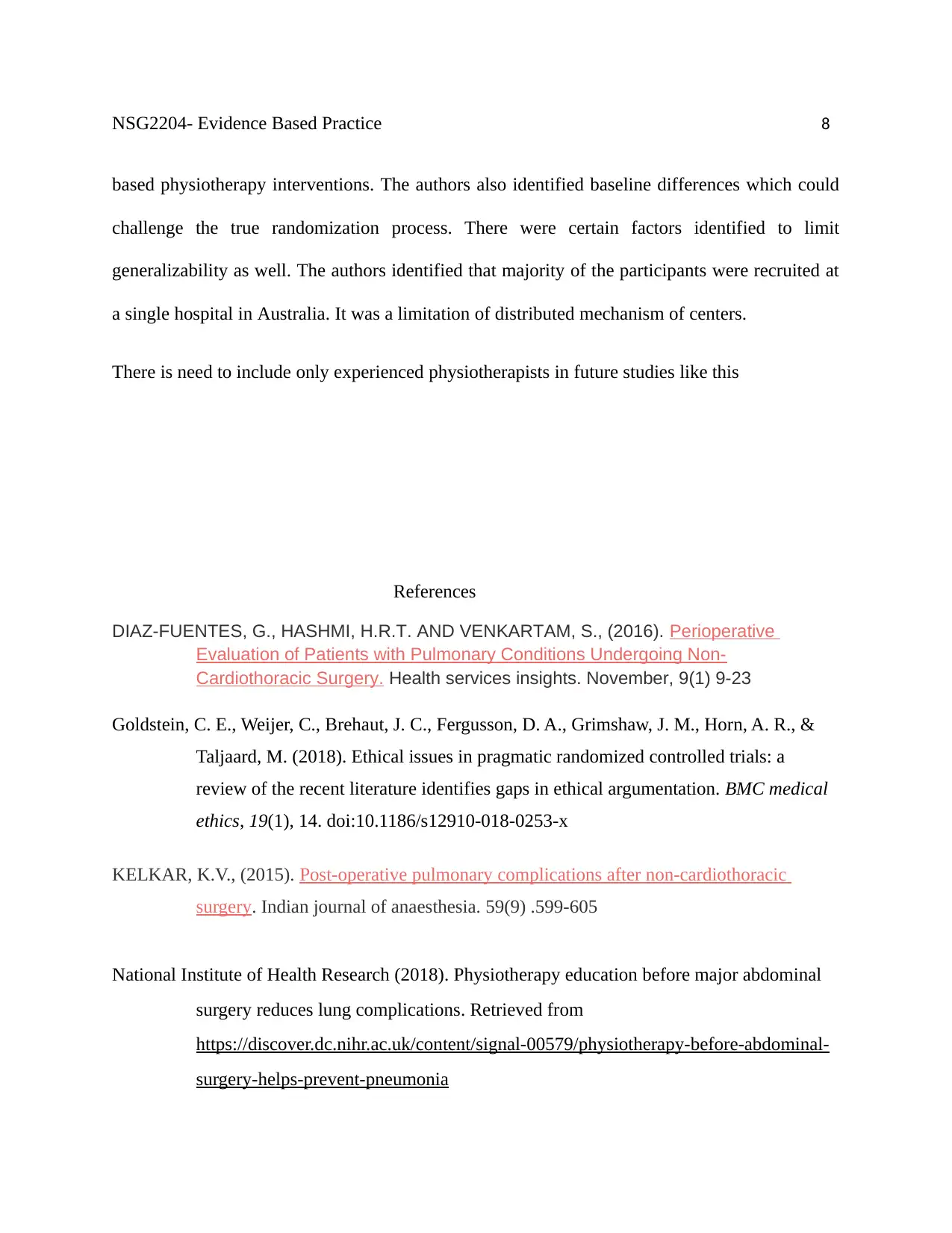
NSG2204- Evidence Based Practice 8
based physiotherapy interventions. The authors also identified baseline differences which could
challenge the true randomization process. There were certain factors identified to limit
generalizability as well. The authors identified that majority of the participants were recruited at
a single hospital in Australia. It was a limitation of distributed mechanism of centers.
There is need to include only experienced physiotherapists in future studies like this
References
DIAZ-FUENTES, G., HASHMI, H.R.T. AND VENKARTAM, S., (2016). Perioperative
Evaluation of Patients with Pulmonary Conditions Undergoing Non-
Cardiothoracic Surgery. Health services insights. November, 9(1) 9-23
Goldstein, C. E., Weijer, C., Brehaut, J. C., Fergusson, D. A., Grimshaw, J. M., Horn, A. R., &
Taljaard, M. (2018). Ethical issues in pragmatic randomized controlled trials: a
review of the recent literature identifies gaps in ethical argumentation. BMC medical
ethics, 19(1), 14. doi:10.1186/s12910-018-0253-x
KELKAR, K.V., (2015). Post-operative pulmonary complications after non-cardiothoracic
surgery. Indian journal of anaesthesia. 59(9) .599-605
National Institute of Health Research (2018). Physiotherapy education before major abdominal
surgery reduces lung complications. Retrieved from
https://discover.dc.nihr.ac.uk/content/signal-00579/physiotherapy-before-abdominal-
surgery-helps-prevent-pneumonia
based physiotherapy interventions. The authors also identified baseline differences which could
challenge the true randomization process. There were certain factors identified to limit
generalizability as well. The authors identified that majority of the participants were recruited at
a single hospital in Australia. It was a limitation of distributed mechanism of centers.
There is need to include only experienced physiotherapists in future studies like this
References
DIAZ-FUENTES, G., HASHMI, H.R.T. AND VENKARTAM, S., (2016). Perioperative
Evaluation of Patients with Pulmonary Conditions Undergoing Non-
Cardiothoracic Surgery. Health services insights. November, 9(1) 9-23
Goldstein, C. E., Weijer, C., Brehaut, J. C., Fergusson, D. A., Grimshaw, J. M., Horn, A. R., &
Taljaard, M. (2018). Ethical issues in pragmatic randomized controlled trials: a
review of the recent literature identifies gaps in ethical argumentation. BMC medical
ethics, 19(1), 14. doi:10.1186/s12910-018-0253-x
KELKAR, K.V., (2015). Post-operative pulmonary complications after non-cardiothoracic
surgery. Indian journal of anaesthesia. 59(9) .599-605
National Institute of Health Research (2018). Physiotherapy education before major abdominal
surgery reduces lung complications. Retrieved from
https://discover.dc.nihr.ac.uk/content/signal-00579/physiotherapy-before-abdominal-
surgery-helps-prevent-pneumonia
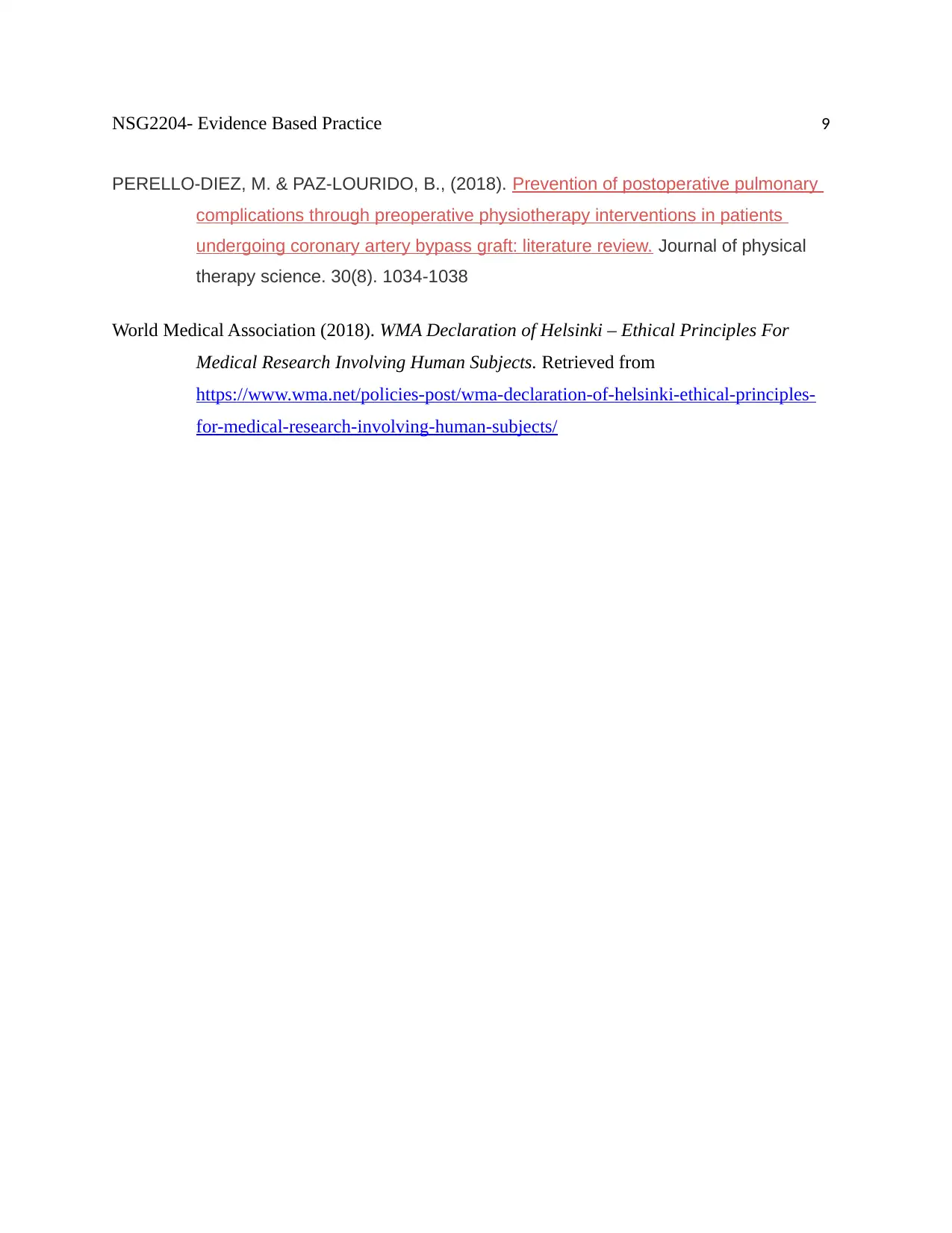
NSG2204- Evidence Based Practice 9
PERELLO-DIEZ, M. & PAZ-LOURIDO, B., (2018). Prevention of postoperative pulmonary
complications through preoperative physiotherapy interventions in patients
undergoing coronary artery bypass graft: literature review. Journal of physical
therapy science. 30(8). 1034-1038
World Medical Association (2018). WMA Declaration of Helsinki – Ethical Principles For
Medical Research Involving Human Subjects. Retrieved from
https://www.wma.net/policies-post/wma-declaration-of-helsinki-ethical-principles-
for-medical-research-involving-human-subjects/
PERELLO-DIEZ, M. & PAZ-LOURIDO, B., (2018). Prevention of postoperative pulmonary
complications through preoperative physiotherapy interventions in patients
undergoing coronary artery bypass graft: literature review. Journal of physical
therapy science. 30(8). 1034-1038
World Medical Association (2018). WMA Declaration of Helsinki – Ethical Principles For
Medical Research Involving Human Subjects. Retrieved from
https://www.wma.net/policies-post/wma-declaration-of-helsinki-ethical-principles-
for-medical-research-involving-human-subjects/
⊘ This is a preview!⊘
Do you want full access?
Subscribe today to unlock all pages.

Trusted by 1+ million students worldwide
1 out of 9
Related Documents
Your All-in-One AI-Powered Toolkit for Academic Success.
+13062052269
info@desklib.com
Available 24*7 on WhatsApp / Email
![[object Object]](/_next/static/media/star-bottom.7253800d.svg)
Unlock your academic potential
Copyright © 2020–2026 A2Z Services. All Rights Reserved. Developed and managed by ZUCOL.





